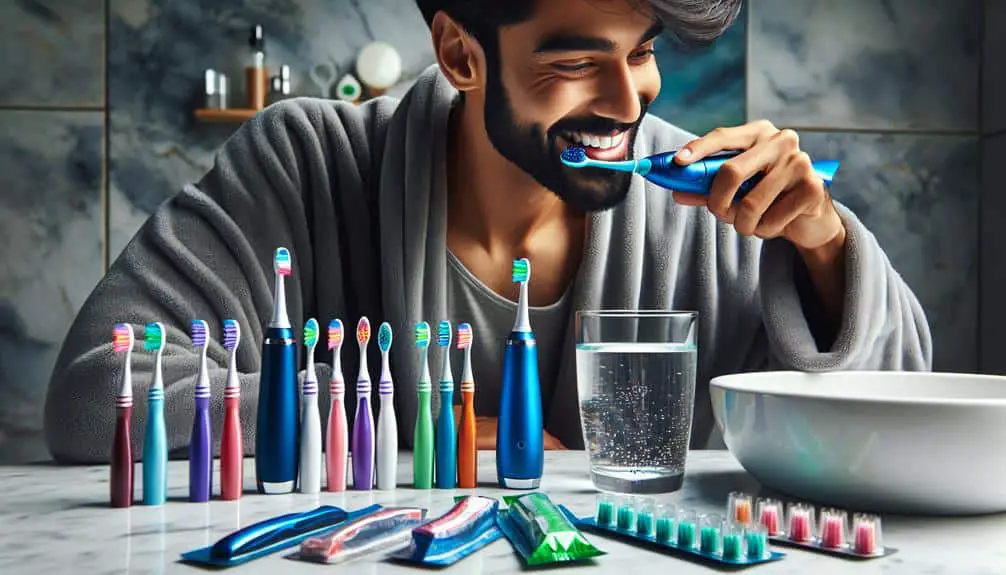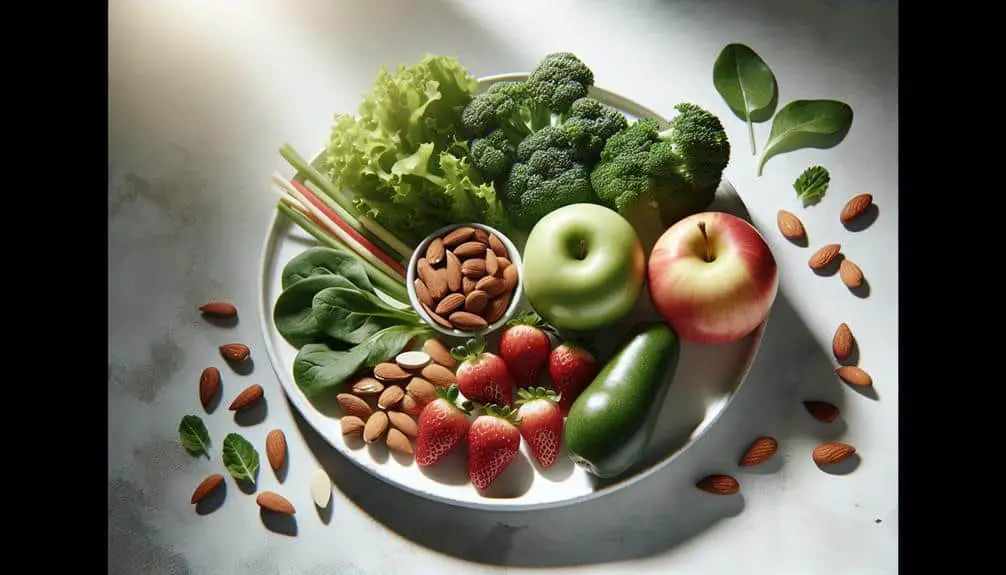To maintain a bright smile, make sure you implement proper brushing techniques using a soft-bristled toothbrush and fluoride toothpaste to eliminate plaque and prevent cavities. Include nutrient-rich foods into your diet, such as calcium-rich foods to strengthen teeth and Vitamin C-rich foods to prevent gum disease. Schedule regular dental check-ups for early issue detection and professional cleaning, and avoid staining beverages by selecting clear options like water and using a straw. Make proper oral hygiene a priority by cleaning your tongue, removing plaque, and establishing daily routines to maintain peak oral health. Mastering these five essential tips is vital for a vibrant smile.
Key Points
- Implement proper brushing techniques to remove plaque and prevent cavities.
- Incorporate a healthy diet with calcium and Vitamin C-rich foods for strong teeth.
- Schedule regular dental check-ups for early issue detection and professional cleaning.
- Avoid staining beverages and rinse mouth after consumption to maintain brightness.
- Practice proper oral hygiene daily, including cleaning the tongue to prevent bad breath.
Brushing Techniques
To maintain a bright smile, it's crucial to implement proper brushing techniques to effectively remove plaque and prevent cavities. Proper technique involves using a soft-bristled toothbrush and fluoride toothpaste. Begin by angling the brush at 45 degrees towards the gum line and using gentle circular motions. Make sure you brush all tooth surfaces, including the inner, outer, and chewing surfaces. Don't forget to brush your tongue to remove bacteria and keep your breath fresh.
In addition to brushing, flossing is of utmost importance in maintaining oral health. Flossing helps remove plaque and food particles from between teeth, where your toothbrush may not reach. To floss correctly, use a piece of floss around 18 inches long, slide it gently between your teeth, and curve it against each tooth in a C shape to clean below the gum line. Ensure to use a fresh section of floss for each tooth to avoid spreading bacteria. Proper brushing and flossing techniques, when done consistently, will contribute to a radiant smile and excellent oral health.
Healthy Diet Habits
Incorporate a diverse range of nutrient-rich foods into your daily meals to support peak oral health and maintain a bright smile. Maintaining a healthy diet not only benefits your overall well-being but also plays an important role in keeping your teeth and gums in excellent condition. Here are some essential tips to help you achieve top-notch oral health through your diet:
- Nutritional benefits: Include foods high in calcium, such as dairy products and leafy greens, to strengthen your teeth. Vitamin C-rich foods like oranges and bell peppers can help prevent gum disease by boosting collagen production.
- Dietary restrictions: Limit sugary and acidic foods to prevent tooth decay and enamel erosion. Opt for sugar-free alternatives and drink plenty of water to maintain saliva production, which helps wash away harmful bacteria.
- Balanced meals: Make sure your meals contain a mix of whole grains, lean proteins, fruits, and vegetables to provide essential nutrients for a healthy smile.
- Snack smart: Choose tooth-friendly snacks like nuts, cheese, or crunchy fruits and vegetables to promote saliva flow and prevent plaque buildup.
Regular Dental Check-ups
When it comes to maintaining a bright smile, staying up to date with regular dental check-ups is vital for ensuring excellent oral health and detecting any issues early on. These check-ups are of utmost importance as they allow your dentist to assess your oral cavity thoroughly, checking for signs of decay, gum disease, or any other potential problems. Prevention is key in dentistry, and through regular check-ups, your dentist can address issues before they escalate, saving you from more extensive treatments in the future.
During these appointments, your dentist will conduct a professional cleaning to remove plaque and tartar buildup, which are factors contributing to oral health issues. Additionally, they'll perform a thorough examination of your teeth, gums, and mouth, looking for any abnormalities or warning signs. By prioritizing regular dental check-ups, you're taking proactive steps in maintaining a healthy smile and preventing serious dental issues down the road. Remember, prevention is always better than cure when it comes to your oral health.
Avoiding Staining Beverages
Restricting the intake of staining beverages is essential for maintaining the brightness of your smile and preventing discoloration of your teeth. Here are some tips to help you avoid beverages that can stain your teeth:
- Choose Wisely: Opt for clear beverages like water or herbal teas instead of dark-colored drinks like coffee or red wine.
- Use a Straw: When you do indulge in beverages like tea or soda, using a straw can help minimize contact with your teeth, reducing the risk of staining.
- Rinse Your Mouth: After consuming staining beverages, rinse your mouth with water to help wash away any residue that could potentially discolor your teeth.
- Explore Alternatives: If you can't go without your morning coffee, consider coffee alternatives like green tea or white tea, which are less likely to stain your teeth.
Proper Oral Hygiene
To maintain a bright smile and keep your teeth free from discoloration, practicing proper oral hygiene is key. Flossing is an essential part of your oral care routine as it removes plaque and food particles from between your teeth that your toothbrush can't reach. The benefits of flossing go beyond just preventing cavities; it also helps in preventing gum disease by reducing inflammation and maintaining healthy gums.
In addition to flossing, cleaning your tongue is another important aspect of oral hygiene that's often overlooked. Bacteria can accumulate on the surface of your tongue, leading to bad breath and potential discoloration of your teeth. Using a tongue scraper or your toothbrush to gently clean your tongue can help remove this buildup and keep your breath fresh.
Incorporating these practices into your daily routine won't only help you maintain a bright smile but also promote overall oral health. Remember, a healthy smile starts with proper oral hygiene habits.
Frequently Asked Questions
Can Certain Medications Affect the Brightness of My Smile?
When taking certain medications, the brightness of your smile can be impacted. These drugs may lead to dental discoloration, affecting the appearance of your teeth. It's important to be mindful of these effects for best oral health.
How Often Should I Replace My Toothbrush for Optimal Oral Health?
To sustain excellent oral health, replace your toothbrush every 3-4 months. Over time, bristles wear out, diminishing efficiency in removing plaque and bacteria buildup. Proper brushing techniques and a fresh toothbrush help guarantee a bright smile.
Are There Any Natural Remedies or DIY Methods to Whiten Teeth at Home?
To whiten teeth at home, consider natural remedies like fruit peels and baking soda, or DIY methods such as oil pulling and activated charcoal. These options offer gentle ways to brighten your smile effectively.
Should I Be Concerned About Teeth Sensitivity When Using Whitening Products?
You should pay attention to teeth sensitivity when using whitening products. Proper sensitivity management is important. Whitening products can affect tooth enamel, causing sensitivity concerns. Consult your dentist for guidance on protecting your teeth while achieving a brighter smile.
How Does Stress or Anxiety Impact the Health and Appearance of My Teeth?
When stress isn't managed well, it can affect your dental health by leading to teeth grinding and jaw clenching. Anxiety might impact your teeth's appearance through habits like nail-biting, which can harm your enamel and oral health.



